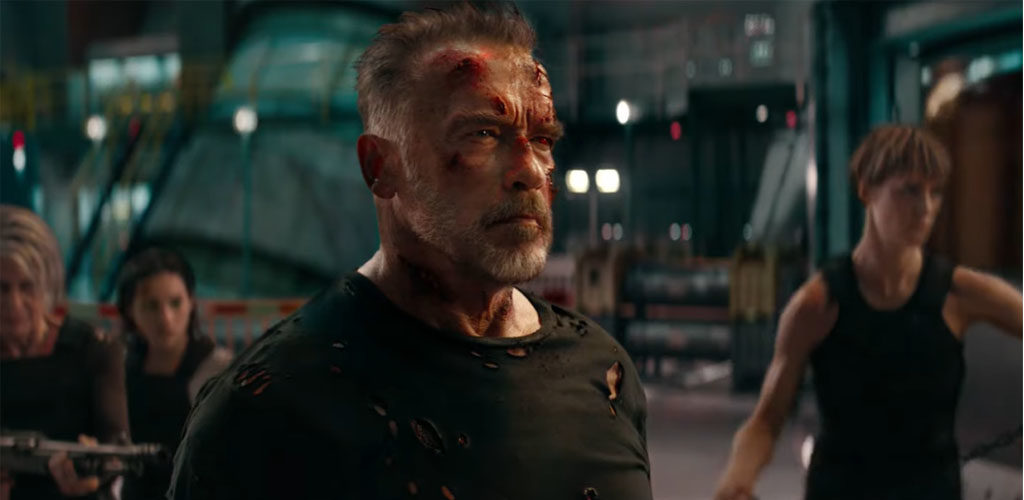Review: Terminator: Dark Fate
Starring: Linda Hamilton, Arnold Schwarzenegger, Mackenzie Davis, Natalia Reyes
The Terminator series has trod a rough path since the much-loved first two films released in 1984 and 1991. While the first two films in the series suggested that the future could be rewritten, the underrated Terminator 3: Rise of the Machines argued that Judgement Day was inevitable, and that while humanity could delay the robot uprising, one day they’d have to face it. Salvation and Genysis followed on directly and tried to introduce new wrinkles into the series’ increasingly convoluted timeline, but now Terminator: Dark Fate has once again re-written the future by deciding to ignore them. It’s instead a direct sequel to Terminator 2, and it’s all the better for it.
In Dark Fate’s timeline, Sarah, John and the T-1000 were successful at the end of Terminator 2, and Skynet was defeated. Now, in 2020, an entirely new Terminator threat has presented itself, and the series’ position on inevitability and predestination shifts yet again – the risk of superpowered, malevolent AI was not specific to Skynet, Dark Fate argues, but a problem humanity will one day make for itself.
The plot is very close to Terminator 2: a new Terminator, the Rev-9, has been sent from the future to murder Daniella ‘Dani’ Ramos, an ordinary woman who will one day be instrumental in the resistance against Legion, a new AI superpower. A cybernetically enhanced human has also been sent back from the future to protect her, and – through a series of plot conveniences that are less convoluted than you might anticipate – Sarah Connor and the T-1000 are once again in the picture. Together, the three action leads need to protect Dani from a new type of Terminator.
Dark Fate is a smart sequel; following on directly from the two Terminator films that everyone liked the most is the right decision. Sarah Connor, declared dead in Terminator 3, returns as a force of nature here: Linda Hamilton’s performance manages to cut right through the occasionally corny dialog she’s given and dig into the emotional turmoil that has plagued Sarah’s life. It’s to the film’s credit that she’s given much more to do than Arnold Schwarzenegger; it seems that the movie recognises that it’s a bit of a stretch to still have the aging Austrian superstar show up in these films, as much fun as his performance is.
The real highlight of the cast is Mackenzie Davis, though, whose augmented human, Grace, is central to the film’s action set-pieces. Dark Fate has the best action in the series since Terminator 2, in large part because it has the wherewithal to limit the ‘bad guy’ to a single, near-unstoppable force. Davis is a tremendous physical presence in the film, throwing her full body into every fight against Gabriel Luna’s Rev-9. Director Tim Miller allows each action scene enough room to breathe, without too many fast cuts or muddled sequences, and the action smartly focuses on just how hard you can hit one of these things without it taking any real lasting damage. There’s a brutality to these scenes, but it’s not super-gory—a robot is taking most of the major hits, after all. The film serves up some appropriately bombastic set-pieces, and while there’s not necessarily anything in these action scenes that we haven’t seen before, they’re consistently satisfying.
Terminator: Dark Fate is a film anchored largely by women heroes, and one that explicitly discusses immigration in ways you might not anticipate. Dani is a Mexican citizen, and part of the plot involves needing to smuggle her into America. The Terminator series has, in its best moments, been an allegory for the brutality of humankind and our willingness to destroy ourselves in the pursuit of what we view as an ideal society. Dark Fate doesn’t make this connection hyper-explicit, but there is a scene set in a detention centre, and the dots are not hard to connect.
The film’s devotion to the original films can occasionally feel slavish – a set-piece right near the end is an awfully convenient nod – but it’s also clear that everyone involved in the production has a clear idea of what made Terminator work in the 80s and 90s, and what needs to change now. The benefit of having James Cameron on board as a producer is clear, and while Terminator: Dark Fate doesn’t necessarily fully live up to the best movies in the series, it charts a clear path forward, and shows that there’s still life left for the Terminator universe. The film ends with a clear sequel set-up, but it’s not clear or yet whether it will be a big enough success to ensure that another one gets made. But as three out of six Terminator films have now effectively reminded us, the future is not yet written.
Terminator: Dark fate is now playing in cinemas
James O’Connor is a critic and journalist












